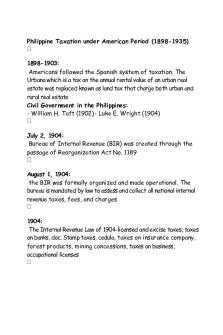Philippine Taxation under American Period PDF

| Title | Philippine Taxation under American Period |
|---|---|
| Course | BS CIVIL ENGINEERING |
| Institution | Cavite State University |
| Pages | 4 |
| File Size | 59.8 KB |
| File Type | |
| Total Downloads | 200 |
| Total Views | 834 |
Summary
Philippine Taxation under American Period (1898-1935) 1898-1903: Americans followed the Spanish system of taxation. The Urbana which is a tax on the annual rental value of an urban real estate was replaced known as land tax that charge both urban and rural real estate Civil Government in the Philip...
Description
Philippine Taxation under American Period (1898-1935) 1898-1903: Americans followed the Spanish system of taxation. The Urbana which is a tax on the annual rental value of an urban real estate was replaced known as land tax that charge both urban and rural real estate Civil Government in the Philippines: - William H. Taft (1902)- Luke E. Wright (1904) July 2, 1904: Bureau of Internal Revenue (BIR) was created through the passage of Reorganization Act No. 1189 August 1, 1904: the BIR was formally organized and made operational. The bureau is mandated by law to assess and collect all national internal revenue taxes, fees, and charges 1904: The Internal Revenue Law of 1904-licensed and excise taxes, taxes on banks, doc. Stamp taxes, cedula, taxes on insurance company, forest products, mining concessions, taxes on business, occupational licenses
1907: Changes in cedula and industrial tax The cedula under the new law went through changes as the rate was fixed per adult male. Some places were authorized to double the fee for the cedula. The industrial tax was charged October 3, 1913: Underwood-Simmons Tariff Act U.S Pres. Woodrow Wilson Governor-General Francis Burton Harrison its purpose was to reduce levies on manufactured and semi-manufactured goods and to eliminate duties on most raw materials. New sources of tax were introduced: Income tax (1914) Inheritance Tax (1919) National Lottery (1932)Taxation during the Commonwealth Period (1935-1945) 1936: Addition of a surtax rate
Nov. 15, 1937: Abolition of Cedula Tax The cedula tax was abolished by the National Assembly of the Philippines because of the heavy burden that brings to the poor people. January 1, 1940: Imposing of Residence Tax Every inhabitant of the Philippines over eighteen years of age who has been regularly employed on a wage or salary basis and on every corporation no matter how created or organized is subject to residence tax. Exemptions are the ff.: -US high commissioner and member of his staff, -Commissioned officers and enlisted soldiers of US army and navy-Representative and officers of foreign powers-Transient visitors staying less than 3 months in Philippines National Internal Revenue Code of 1939 -New tax system during commonwealth...
Similar Free PDFs

Evolution OF Philippine Taxation
- 5 Pages

Taxation
- 99 Pages

Taxation
- 7 Pages

philippine artists.docx
- 40 Pages

PHILIPPINE CONSTITUTION
- 2 Pages

PHILIPPINE HISTORY
- 16 Pages

Philippine Indepedence
- 2 Pages
Popular Institutions
- Tinajero National High School - Annex
- Politeknik Caltex Riau
- Yokohama City University
- SGT University
- University of Al-Qadisiyah
- Divine Word College of Vigan
- Techniek College Rotterdam
- Universidade de Santiago
- Universiti Teknologi MARA Cawangan Johor Kampus Pasir Gudang
- Poltekkes Kemenkes Yogyakarta
- Baguio City National High School
- Colegio san marcos
- preparatoria uno
- Centro de Bachillerato Tecnológico Industrial y de Servicios No. 107
- Dalian Maritime University
- Quang Trung Secondary School
- Colegio Tecnológico en Informática
- Corporación Regional de Educación Superior
- Grupo CEDVA
- Dar Al Uloom University
- Centro de Estudios Preuniversitarios de la Universidad Nacional de Ingeniería
- 上智大学
- Aakash International School, Nuna Majara
- San Felipe Neri Catholic School
- Kang Chiao International School - New Taipei City
- Misamis Occidental National High School
- Institución Educativa Escuela Normal Juan Ladrilleros
- Kolehiyo ng Pantukan
- Batanes State College
- Instituto Continental
- Sekolah Menengah Kejuruan Kesehatan Kaltara (Tarakan)
- Colegio de La Inmaculada Concepcion - Cebu








